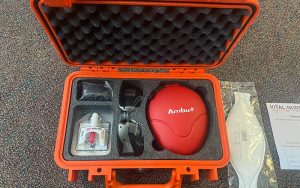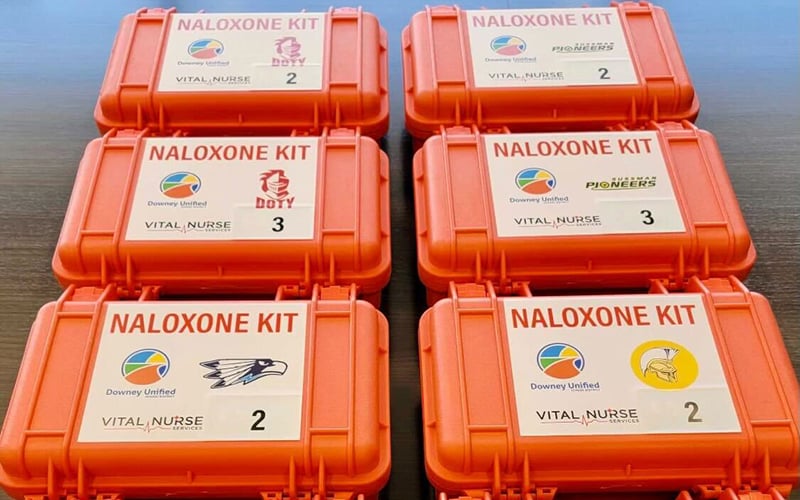LOS ANGELES – Melanie Ramos, a vibrant 15-year-old known to her family as a loving child, was found unconscious last month in a girls’ restroom at Helen Bernstein High School in Hollywood. She later died of a suspected fentanyl overdose.
But two weeks ago, another student at Bernstein High was saved when school officials administered Narcan, a nasal spray that reverses the effect of opioid overdoses.
The episodes underscore how school districts around the country, including those in Arizona, are trying to quickly respond to the growing toll from fentanyl, a synthetic opioid that the Centers for Disease Control and Prevention lists as 50 times more potent than heroin.
The Los Angeles Unified School District, the nation’s second largest with more than 500,000 students, announced in September that it will make naloxone, commonly known under the brand name Narcan, available in all the district’s over 1,000 schools, including Bernstein.
“We have an urgent crisis on our hands,” Superintendent Alberto Carvalho said in announcing the move. “Research shows the availability of naloxone, along with overdose education, is effective at decreasing overdoses and deaths and will save lives.”
At least nine teenagers in the district have overdosed from pills potentially laced with fentanyl.
The CDC reported 13,165 deaths involving heroin or other opioid-related substances, including fentanyl, in 2020. More specifically, fentanyl overdoses in the U.S. have risen more than 59% from 2019 to 2020. This April, The Guardian reported that US teen overdose deaths doubled since 2019, climbing from 492 to 1,146 in 2021.
In Arizona, at least five people die from opioid overdoses every day, and so far this year, 372 opioid-related deaths have been reported, according to the state Department of Health Services.
Arizona has been aggressive in addressing this issue in schools, acting long before the LA district made its announcement. It’s one of only six states, along with Washington, Oregon, Rhode Island, Maryland and Tennessee, that requires schools to have a naloxone policy, according to a 2020 report by the Legislative Analysis and Public Policy Association.
School districts around the country are trying to respond to the crisis.
In Iowa, for instance, Des Moines Public Schools has naloxone on hand at each of its campuses. In the last school year, there were 11 medical emergencies in which the nasal spray could have been beneficial, although there were no deaths in the incidents, The Des Moines Register reports.

More schools around the country are ordering Narcan kits like this one to reverse opioid overdose. (Photo courtesy of Robert Jagielski with the Downey Unified School District)
Baltimore and its suburbs in Howard County, Maryland, are looking to place naloxone in schools after a school nurse in Anne Arundel County used it to save a high school student suffering from an overdose, The Baltimore Sun reports.
Other districts in Southern California also are dealing with overdoses. The mother of Trinity Cornejo, 17, who attended Troy High School in Fullerton, believes her daughter died from an accidental fentanyl overdose, although it hasn’t been confirmed by authorities.
The Downey Unified School District southeast of Los Angeles, took action to combat any fentanyl use among its 22,300 students. Each school in the district has several doses of Narcan available and trained staff to administer it.
Robert Jagielski, the district’s senior director of student safety, wellness and engagement, joined school nurses as the initial group was trained over the summer. A subsequent session involved athletic trainers and other authorized school staff. Now the district is looking to expand this training to teachers, coaches and others.
“We were proactive,” Jagielski said. “This stuff is bad enough, but sometimes minutes make a difference.”
The Downey district offers fentanyl prevention-related resources, such as student assemblies, parent-teacher association meetings and newsletters and online learning that are accessible to students, teachers and parents.
“We have got to take care of each other, and that is the kind of message we’re trying to bring to the table,” Jagielski said. “We really try to come together to try to get the message out and try to keep our schools as safe as possible.”
One way the district is accomplishing it is through Armando Gudino, a parent volunteer who has expertise in drug policy.
Gudino, whose two children attend Downey schools, wants to connect with parents so they can better understand their child’s position and the changing climates of 2022.
“This drug war that we saw declared 50 years ago has failed,” he said. “So we find ourselves in a time in which it’s obligatory that we take other measures to engage people.”
He said he tries to engage families in constructive, meaningful conversations about how to keep students safe.
“Sometimes we want to explore and be adventurous, maybe even spur creativity, but these days that interest and willingness to experiment can, unfortunately, lead to death,” Gudino said.
A lesson that school districts around the country are learning all too well when it comes to fentanyl.

